it的用法[上学期]
图片预览
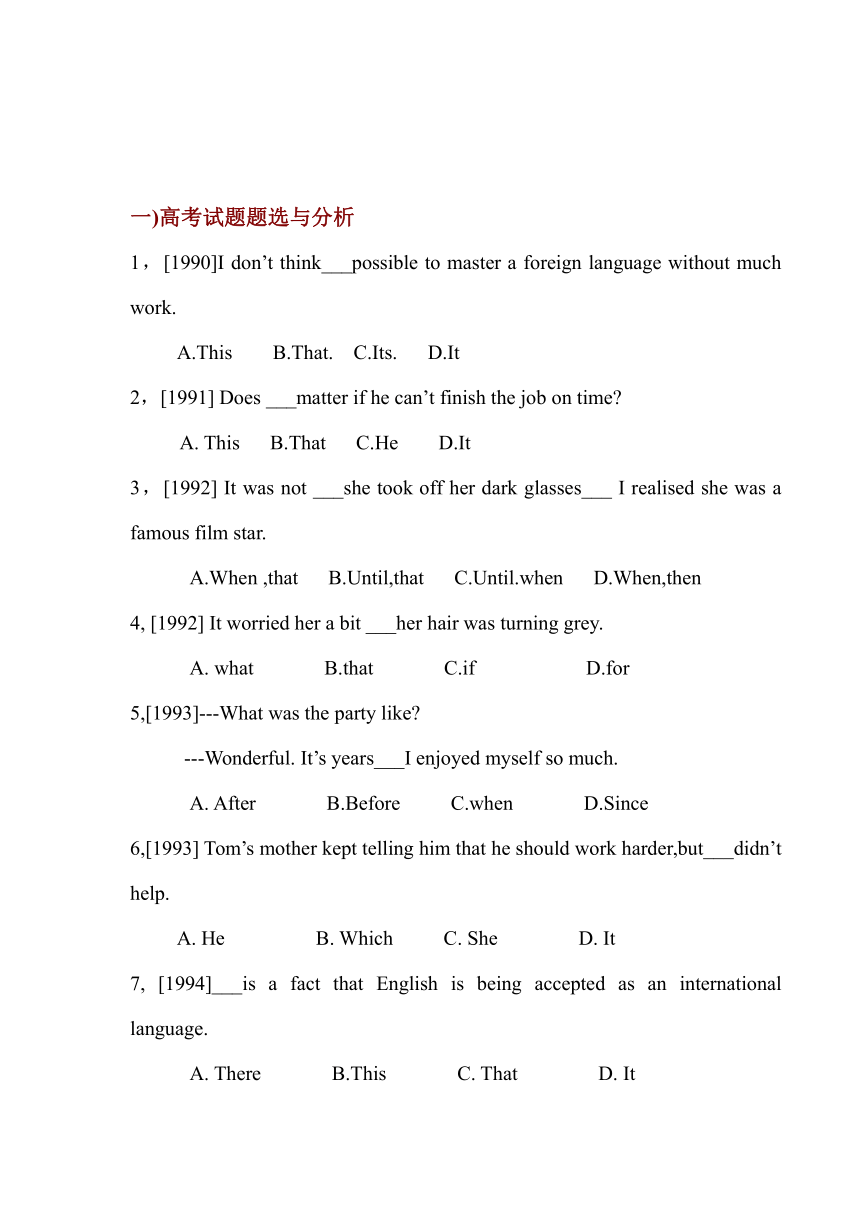
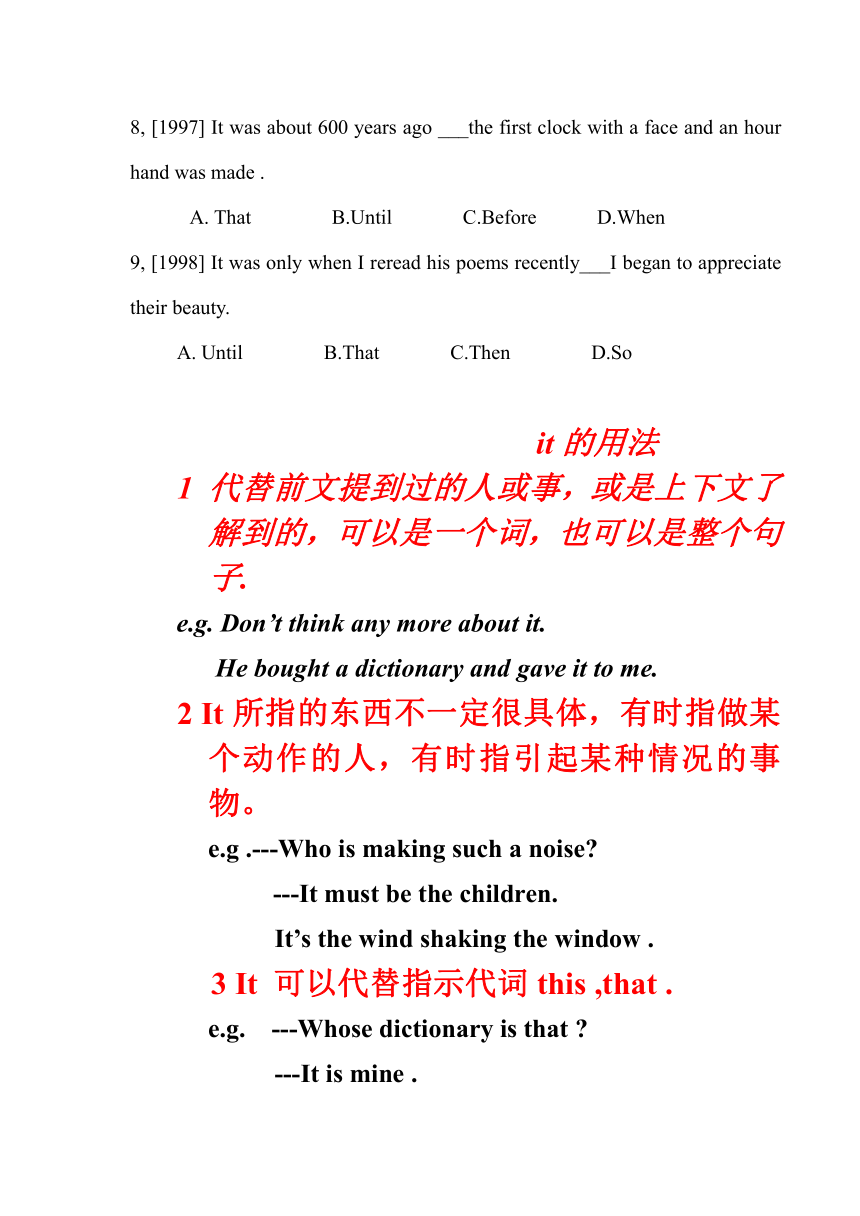
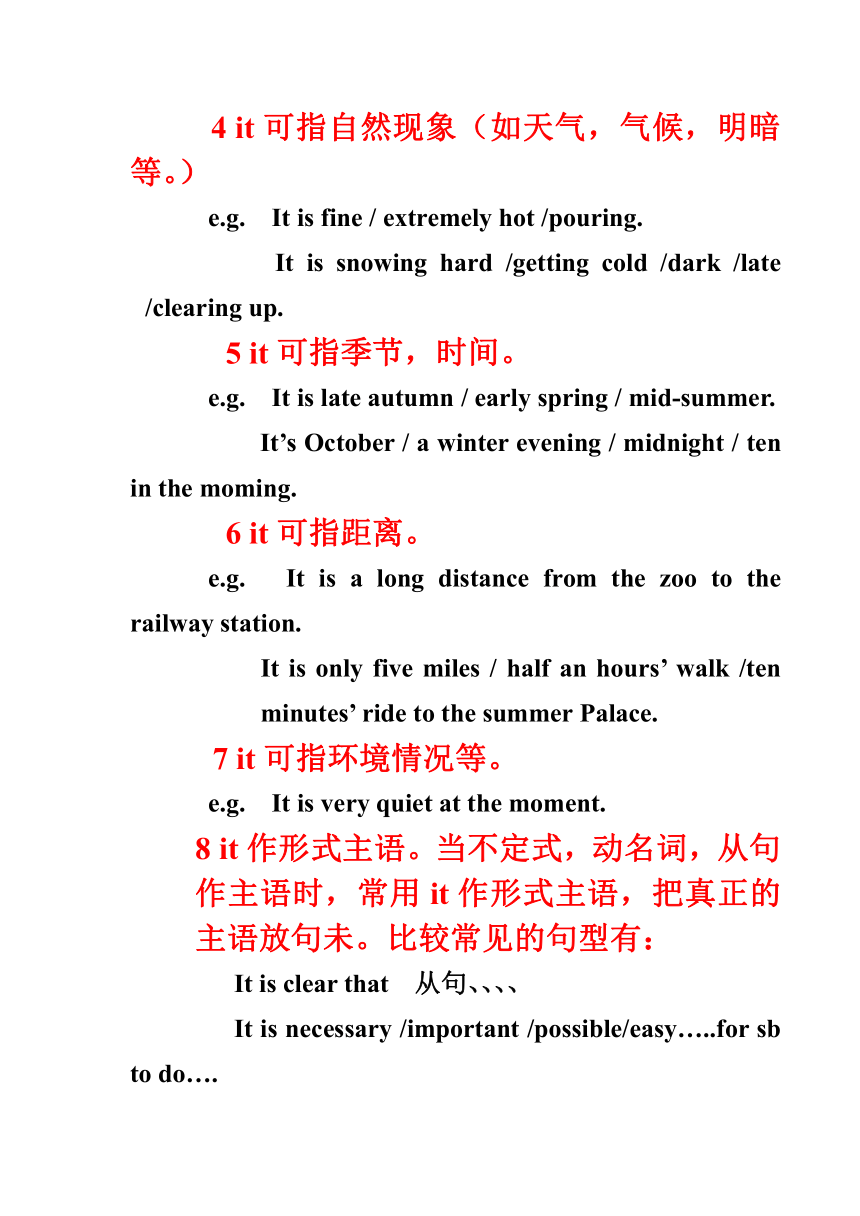
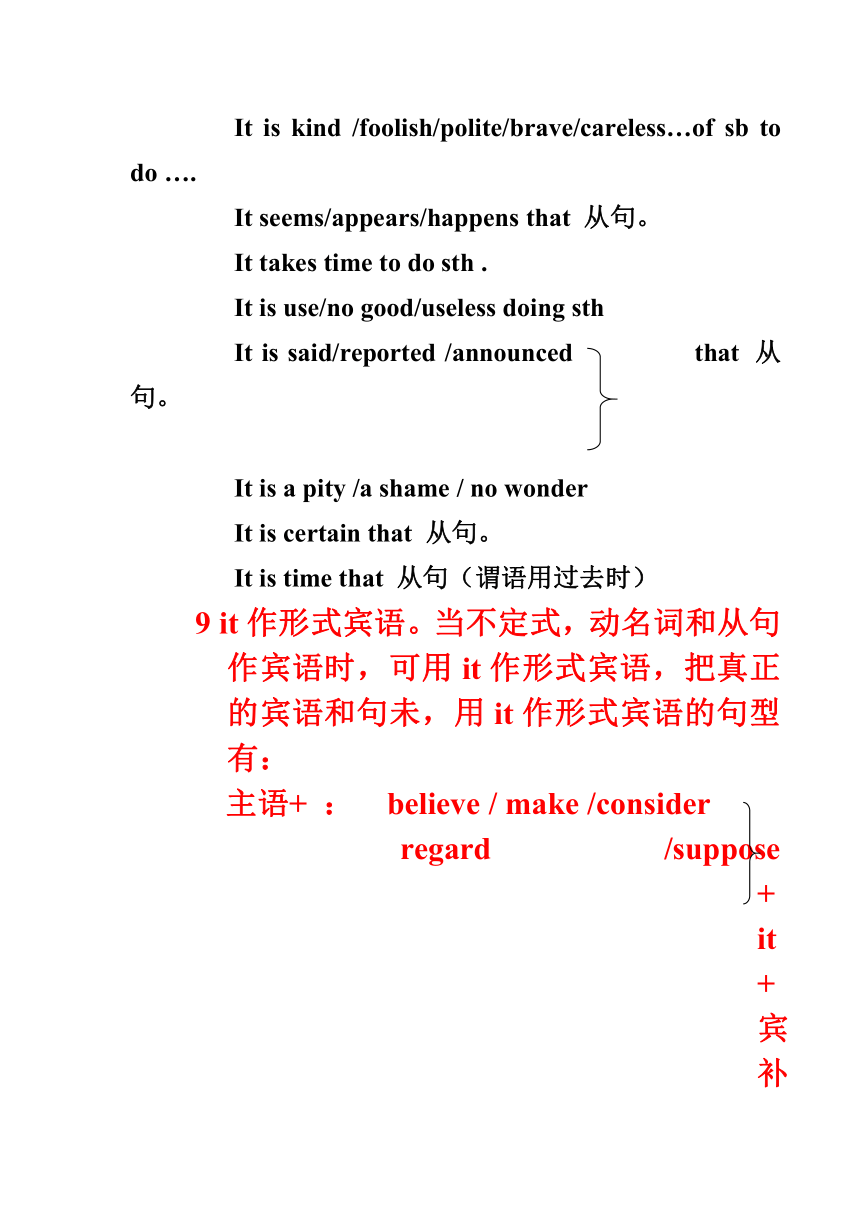
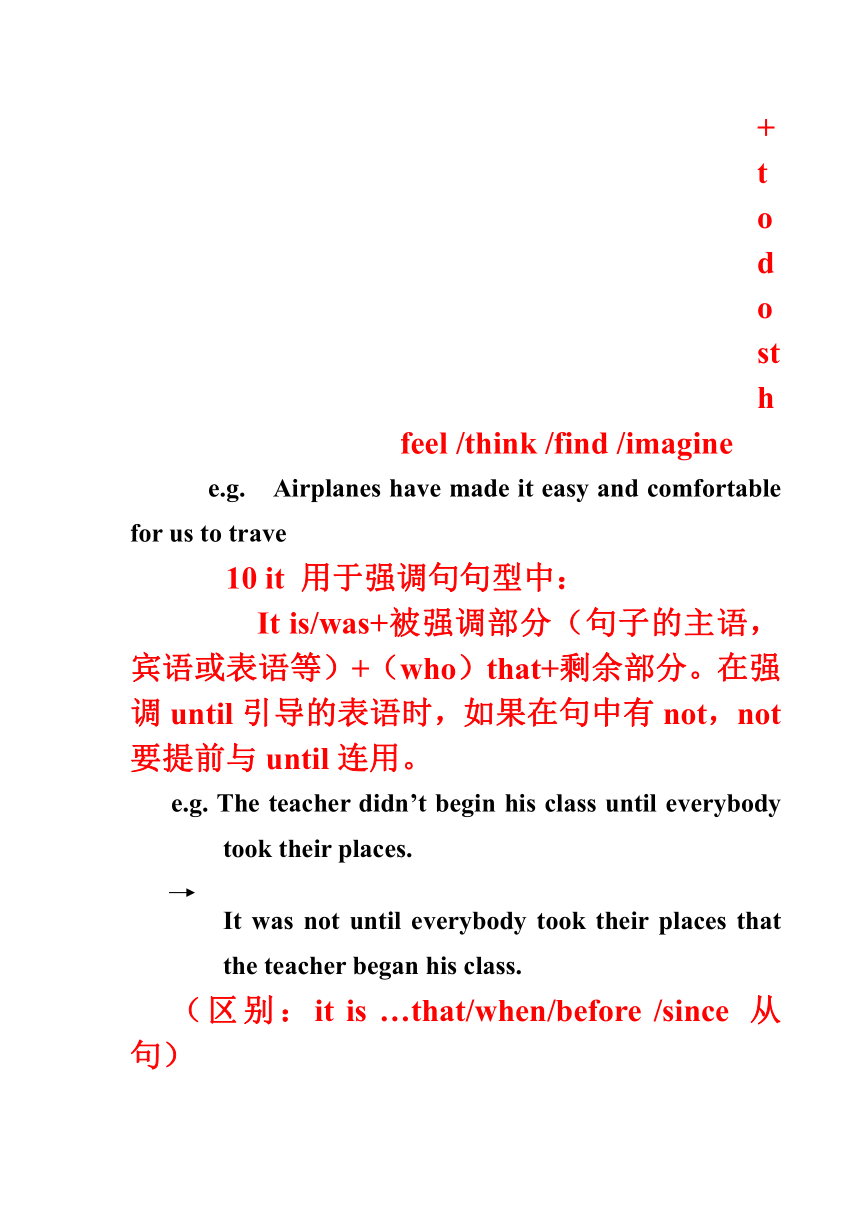
文档简介
一)高考试题题选与分析
1,[1990]I don’t think___possible to master a foreign language without much work.
A.This B.That. C.Its. D.It
2,[1991] Does ___matter if he can’t finish the job on time
A. This B.That C.He D.It
3,[1992] It was not ___she took off her dark glasses___ I realised she was a famous film star.
A.When ,that B.Until,that C.Until.when D.When,then
4, [1992] It worried her a bit ___her hair was turning grey.
A. what B.that C.if D.for
5,[1993]---What was the party like
---Wonderful. It’s years___I enjoyed myself so much.
A. After B.Before C.when D.Since
6,[1993] Tom’s mother kept telling him that he should work harder,but___didn’t help.
A. He B. Which C. She D. It
7, [1994]___is a fact that English is being accepted as an international language.
A. There B.This C. That D. It
8, [1997] It was about 600 years ago ___the first clock with a face and an hour hand was made .
A. That B.Until C.Before D.When
9, [1998] It was only when I reread his poems recently___I began to appreciate their beauty.
A. Until B.That C.Then D.So
it的用法
1 代替前文提到过的人或事,或是上下文了解到的,可以是一个词,也可以是整个句子.
e.g. Don’t think any more about it.
He bought a dictionary and gave it to me.
2 It所指的东西不一定很具体,有时指做某个动作的人,有时指引起某种情况的事物。
e.g .---Who is making such a noise
---It must be the children.
It’s the wind shaking the window .
3 It 可以代替指示代词this ,that .
e.g. ---Whose dictionary is that
---It is mine .
4 it可指自然现象(如天气,气候,明暗等。)
e.g. It is fine / extremely hot /pouring.
It is snowing hard /getting cold /dark /late /clearing up.
5 it可指季节,时间。
e.g. It is late autumn / early spring / mid-summer.
It’s October / a winter evening / midnight / ten in the moming.
6 it可指距离。
e.g. It is a long distance from the zoo to the railway station.
It is only five miles / half an hours’ walk /ten minutes’ ride to the summer Palace.
7 it可指环境情况等。
e.g. It is very quiet at the moment.
8 it作形式主语。当不定式,动名词,从句作主语时,常用it作形式主语,把真正的主语放句未。比较常见的句型有:
It is clear that 从句、、、、
It is necessary /important /possible/easy…..for sb to do….
It is kind /foolish/polite/brave/careless…of sb to do ….
It seems/appears/happens that 从句。
It takes time to do sth .
It is use/no good/useless doing sth
It is said/reported /announced that 从句。
It is a pity /a shame / no wonder
It is certain that 从句。
It is time that 从句(谓语用过去时)
9 it作形式宾语。当不定式,动名词和从句作宾语时,可用it作形式宾语,把真正的宾语和句未,用it作形式宾语的句型有:
主语+ : believe / make /consider
regard /suppose +it +宾补+to do sth
feel /think /find /imagine
e.g. Airplanes have made it easy and comfortable for us to trave
10 it 用于强调句句型中:
It is/was+被强调部分(句子的主语,宾语或表语等)+(who)that+剩余部分。在强调until引导的表语时,如果在句中有not,not要提前与until连用。
e.g. The teacher didn’t begin his class until everybody took their places.
It was not until everybody took their places that the teacher began his class.
(区别:it is …that/when/before /since 从句)
A:It is …that从句。
引导主语从句It is clear that he can do it well.
2. It is the first /second…time (that)+主语+完成时“这是第二次做…
B.It is …when 从句
e.g. I think it will be midnight when the work is finished.
e.g. It was september 10,1999when I went to Beijing.
C. It is …从句。
常用It is /was /will be long /not long /many years/hours/a few minutes before…表示 …去….就 /才“或”不多久就…
e.g. It was not long before the whole country rose up and drove the Austrian soldiers from their homeland.
D. It is …since 从句 意思是;“自从…以来已经多久了”。如果since从句中的谓语动词是短暂性动词,那么就表示该动作的开始,如果从句中的谓语动词是延续性动词或表示状态的动词,则指动作或状态的结束。
就学生而言:It is nearly 12 years since I became a student.
就老师而言:It is nearly 12 years since I was a student.
二.练习:
1.Oxford,as we know___ ,is one the best unirersity in the world.
A.that B.it c.this D./
2.It was the third time I __ to that city.
A.have been B .had been C.came D. Was .
3.When was it __ you arrived in New York
A.that B.at which C.before D. Since.
4.It was ___ I met Mr.Green in Shanghai.
A. ten years since B.five years C.two months when D. many years ago that
5.Jack is ill , have you heard about __
A. that B. this C.it D.which
6. __ who suggested that he__ to New York in order to get a direct fight.
A.It was her …went B. It was her …go
C. It was she …went D.It was she …go
__has already been pointed out , grammar is not a set of dead rules.
A . As. B.It C.That D. This
__he realized it was too late to return home.
A.No sooner it grew dark than B. Hardly did it grow dark when
C. It was not until dark that D. It was until dark that
9. I was disappointed with the film, I had expected __ to be much better.
A.that B.this C.it D. Them.
10. ---So noisy outside!
---__Bill and Jack quarrelling!
A. It is B.There are C. Then are D. May be
11 .It __ Mike and Mary who helped the old man several days ago.
A.were B.was C. are D. had been
12.---Was that the new school master who walked by
--- _____________ .
A. It must be that B. It must have been
C. He must be D.This must have been.
13.He felt ___ to work for human rights and progress.
A. it his duty B.his duty
C.that is a duty D.that is his duty
答案:
1.B. 2。B 3。A 4。D 5。A 6。D 7。A 8。C 9。C
10.A 11。C 12。B 13。B 14。A 15。D
代 词 IT 的 用 法
1、代替则提到的一件事物。
2、起提示代词的作用,指一个人或事物;指做某个动作的人。
3、表示时间、天气、距离等。
4、代替一个由否定式、动名词短语或主语从句。
5、自然现象(如天气、气候、明暗等)、季节时间、环境等。
6、强调句型:It is/was+ 被强调部分+that...
eg: It was Xiao Yang that did it.
7、It takes sb. some time to do sth.
eg: It took the sixth blind man quite a long time to find the elephant.
8、It is one's duty to do sth.
eg: It is our duty to attend this matter.
9、It is no use /good doing sth.
eg: It's no use talking to about it.
10、It is + for/of sb. to do sth.(necessary, important, strange, natural,后用for,在foolish, kind, nice, clever, silly, stupid, good, right, wrong rude等后用of。
eg:It is necessary for us to master a foreign language.
It is very kind of you help me with my English.
11、It happens/seems等动词+that从句:
eg:It happened that I wasn't there that day.
It seemed that he had read the report.
12、It doesn't matter to sb. whether...句型:
eg:It doesn't matter to me whether he comes or not.
13、It is said/supposed/known/reported/announced/decided等动词+that从句:
eg: It is said that the novel has been translated into several foreign languages.
14、It is + 时间 + since从句(从句中谓语动词用一般过去时)。
eg: It is ages since I last saw him.
15、It is + the 序数词 + time + that从句(从句中通常用现在完成时)。
eg: It/This is the second time that I have been to Beijng.
16、It is + adj.+ that 从句
(形容词有:important, necessay, impossible, natural等,that从句中通常用虚拟语气should do或do).
eg: It is important that we should keep the balance of nature.
17、It is + n. + that 从句 (名词有:a pity, a shame, no wonder等)
eg: It is a pity that you didn't come yesterday.
18、It is time that从句(从句中虚拟语气did).
eg: It is time (that) you went to bed.
19、It is (not) long before从句(从句中用一般现在时代替一般将来时)。
eg: It was not long before they drove the invaders from their country.
20、动词(feel, think, make, find, consider)+ it +adj.+that从句。
动词(feel. think, make, find, consider)+it+adj.+to do sth.
另:take it for granted that从句。
eg: You may think it strange that anyone would live there.
I have made it a rule to have a walk after supper every day.
You should not take it for granted that your parents should give you money.
表示将来的几种动词形式
1、be about to即将做,就要做
eg: I was about to start out when it began to snow.
2、be to do sth.按约定、计划、或按职责、义务应该或注定在短期将来要发生的动作。
eg: The sports meet is to take place on Sunday morning.
3、be going to do sth.表示已经决定或已经按排要做的事,也可用来表示很可能或必然发生的事。表示说话人的判断,不宜用will代替be going to。如表示交谈时的临时决定,则不宜用be going to,应用will/shall。
4、来往性动作及某些短暂性动词可用进行时来表示将来,可以用be going to do sth.用法替换使用,而不改变其意思。
What, whatever 与no matter what辨析
1、what与whatever均可作连代词引导名词性从句,what引导的名词性从句在句中作主语、表语、宾语,意为“所...的事物”,相当于the thing(s) which; whatever引导的名词性从句在句中可作主语、宾语、宾语补足语,意思是“凡是...的事物”,相当于anything/everything that,语气比what更强烈一些。
eg: What/Whatever we do id to serve the people.
These books are just what I need.(不可用whatever)
We'll make him whatever he is fit for.(不可用what)
2、whatever与no matter what均可作从属连词,引导让步状语从句。whatever常用于正式场合,no matter what多用于口语或非正式场合,一般情况下,两者可互换,意思是“无论什么,不管什么”。
eg: No matter what / whatever happens, keep on beginning.
3、what只用来引导名词性从句,不可用来引导让步状语从句,no matter what只可用来引导让步状语从句,不可用来引导名词性从句,whatever既可引导名词性从句,也可引导让步状语从句。
eg: Please tell me what/whatever you saw.
Whatever happens, keep calm.
4、Whatever可用于否定句或含有any的句子,其位置必须放在名词或代词后面,用来加强否定语气,表示“毫不...”,“一点儿”,“任何...”,即使在表示人的anyone等后也可以这样用,而what或no matter what则不可这样用。
eg: He knew nothing whatever about it.
I cannot see anyone whatever in the park.
Deep 和Deeply的用法
deep和deeply一样,也可用作副词,但两者在具体的用法上有很大差异,指动作或事物的实际深度时,较多地用deep,间或也可用deeply。
eg:They are digging deep to find water.
The ship sank deep in the sea.
My father often works deep into the night.
Still waters run deep.(静水必深、大智若愚)
When you plough the soil, plough deep the first time and less the second time.
与介词into短语连用时,一般用deep,而不deeply用;deeply较多地用于喻义,尤指情感的深度,这时一般不用副词deep。
eg: be deeply interested in hurt sb deeply
deeply regret be deeply in love with be deeply moved
形容词deep除表示物体的深度以外,可以用来指物体的纵深,睡眠的深沉,悲痛的深切,工作的专心。 eg: ten meters deep deep in the woods
be in a deep sleep take a deep breath
be in deep sorrow deep in t thought
1,[1990]I don’t think___possible to master a foreign language without much work.
A.This B.That. C.Its. D.It
2,[1991] Does ___matter if he can’t finish the job on time
A. This B.That C.He D.It
3,[1992] It was not ___she took off her dark glasses___ I realised she was a famous film star.
A.When ,that B.Until,that C.Until.when D.When,then
4, [1992] It worried her a bit ___her hair was turning grey.
A. what B.that C.if D.for
5,[1993]---What was the party like
---Wonderful. It’s years___I enjoyed myself so much.
A. After B.Before C.when D.Since
6,[1993] Tom’s mother kept telling him that he should work harder,but___didn’t help.
A. He B. Which C. She D. It
7, [1994]___is a fact that English is being accepted as an international language.
A. There B.This C. That D. It
8, [1997] It was about 600 years ago ___the first clock with a face and an hour hand was made .
A. That B.Until C.Before D.When
9, [1998] It was only when I reread his poems recently___I began to appreciate their beauty.
A. Until B.That C.Then D.So
it的用法
1 代替前文提到过的人或事,或是上下文了解到的,可以是一个词,也可以是整个句子.
e.g. Don’t think any more about it.
He bought a dictionary and gave it to me.
2 It所指的东西不一定很具体,有时指做某个动作的人,有时指引起某种情况的事物。
e.g .---Who is making such a noise
---It must be the children.
It’s the wind shaking the window .
3 It 可以代替指示代词this ,that .
e.g. ---Whose dictionary is that
---It is mine .
4 it可指自然现象(如天气,气候,明暗等。)
e.g. It is fine / extremely hot /pouring.
It is snowing hard /getting cold /dark /late /clearing up.
5 it可指季节,时间。
e.g. It is late autumn / early spring / mid-summer.
It’s October / a winter evening / midnight / ten in the moming.
6 it可指距离。
e.g. It is a long distance from the zoo to the railway station.
It is only five miles / half an hours’ walk /ten minutes’ ride to the summer Palace.
7 it可指环境情况等。
e.g. It is very quiet at the moment.
8 it作形式主语。当不定式,动名词,从句作主语时,常用it作形式主语,把真正的主语放句未。比较常见的句型有:
It is clear that 从句、、、、
It is necessary /important /possible/easy…..for sb to do….
It is kind /foolish/polite/brave/careless…of sb to do ….
It seems/appears/happens that 从句。
It takes time to do sth .
It is use/no good/useless doing sth
It is said/reported /announced that 从句。
It is a pity /a shame / no wonder
It is certain that 从句。
It is time that 从句(谓语用过去时)
9 it作形式宾语。当不定式,动名词和从句作宾语时,可用it作形式宾语,把真正的宾语和句未,用it作形式宾语的句型有:
主语+ : believe / make /consider
regard /suppose +it +宾补+to do sth
feel /think /find /imagine
e.g. Airplanes have made it easy and comfortable for us to trave
10 it 用于强调句句型中:
It is/was+被强调部分(句子的主语,宾语或表语等)+(who)that+剩余部分。在强调until引导的表语时,如果在句中有not,not要提前与until连用。
e.g. The teacher didn’t begin his class until everybody took their places.
It was not until everybody took their places that the teacher began his class.
(区别:it is …that/when/before /since 从句)
A:It is …that从句。
引导主语从句It is clear that he can do it well.
2. It is the first /second…time (that)+主语+完成时“这是第二次做…
B.It is …when 从句
e.g. I think it will be midnight when the work is finished.
e.g. It was september 10,1999when I went to Beijing.
C. It is …从句。
常用It is /was /will be long /not long /many years/hours/a few minutes before…表示 …去….就 /才“或”不多久就…
e.g. It was not long before the whole country rose up and drove the Austrian soldiers from their homeland.
D. It is …since 从句 意思是;“自从…以来已经多久了”。如果since从句中的谓语动词是短暂性动词,那么就表示该动作的开始,如果从句中的谓语动词是延续性动词或表示状态的动词,则指动作或状态的结束。
就学生而言:It is nearly 12 years since I became a student.
就老师而言:It is nearly 12 years since I was a student.
二.练习:
1.Oxford,as we know___ ,is one the best unirersity in the world.
A.that B.it c.this D./
2.It was the third time I __ to that city.
A.have been B .had been C.came D. Was .
3.When was it __ you arrived in New York
A.that B.at which C.before D. Since.
4.It was ___ I met Mr.Green in Shanghai.
A. ten years since B.five years C.two months when D. many years ago that
5.Jack is ill , have you heard about __
A. that B. this C.it D.which
6. __ who suggested that he__ to New York in order to get a direct fight.
A.It was her …went B. It was her …go
C. It was she …went D.It was she …go
__has already been pointed out , grammar is not a set of dead rules.
A . As. B.It C.That D. This
__he realized it was too late to return home.
A.No sooner it grew dark than B. Hardly did it grow dark when
C. It was not until dark that D. It was until dark that
9. I was disappointed with the film, I had expected __ to be much better.
A.that B.this C.it D. Them.
10. ---So noisy outside!
---__Bill and Jack quarrelling!
A. It is B.There are C. Then are D. May be
11 .It __ Mike and Mary who helped the old man several days ago.
A.were B.was C. are D. had been
12.---Was that the new school master who walked by
--- _____________ .
A. It must be that B. It must have been
C. He must be D.This must have been.
13.He felt ___ to work for human rights and progress.
A. it his duty B.his duty
C.that is a duty D.that is his duty
答案:
1.B. 2。B 3。A 4。D 5。A 6。D 7。A 8。C 9。C
10.A 11。C 12。B 13。B 14。A 15。D
代 词 IT 的 用 法
1、代替则提到的一件事物。
2、起提示代词的作用,指一个人或事物;指做某个动作的人。
3、表示时间、天气、距离等。
4、代替一个由否定式、动名词短语或主语从句。
5、自然现象(如天气、气候、明暗等)、季节时间、环境等。
6、强调句型:It is/was+ 被强调部分+that...
eg: It was Xiao Yang that did it.
7、It takes sb. some time to do sth.
eg: It took the sixth blind man quite a long time to find the elephant.
8、It is one's duty to do sth.
eg: It is our duty to attend this matter.
9、It is no use /good doing sth.
eg: It's no use talking to about it.
10、It is + for/of sb. to do sth.(necessary, important, strange, natural,后用for,在foolish, kind, nice, clever, silly, stupid, good, right, wrong rude等后用of。
eg:It is necessary for us to master a foreign language.
It is very kind of you help me with my English.
11、It happens/seems等动词+that从句:
eg:It happened that I wasn't there that day.
It seemed that he had read the report.
12、It doesn't matter to sb. whether...句型:
eg:It doesn't matter to me whether he comes or not.
13、It is said/supposed/known/reported/announced/decided等动词+that从句:
eg: It is said that the novel has been translated into several foreign languages.
14、It is + 时间 + since从句(从句中谓语动词用一般过去时)。
eg: It is ages since I last saw him.
15、It is + the 序数词 + time + that从句(从句中通常用现在完成时)。
eg: It/This is the second time that I have been to Beijng.
16、It is + adj.+ that 从句
(形容词有:important, necessay, impossible, natural等,that从句中通常用虚拟语气should do或do).
eg: It is important that we should keep the balance of nature.
17、It is + n. + that 从句 (名词有:a pity, a shame, no wonder等)
eg: It is a pity that you didn't come yesterday.
18、It is time that从句(从句中虚拟语气did).
eg: It is time (that) you went to bed.
19、It is (not) long before从句(从句中用一般现在时代替一般将来时)。
eg: It was not long before they drove the invaders from their country.
20、动词(feel, think, make, find, consider)+ it +adj.+that从句。
动词(feel. think, make, find, consider)+it+adj.+to do sth.
另:take it for granted that从句。
eg: You may think it strange that anyone would live there.
I have made it a rule to have a walk after supper every day.
You should not take it for granted that your parents should give you money.
表示将来的几种动词形式
1、be about to即将做,就要做
eg: I was about to start out when it began to snow.
2、be to do sth.按约定、计划、或按职责、义务应该或注定在短期将来要发生的动作。
eg: The sports meet is to take place on Sunday morning.
3、be going to do sth.表示已经决定或已经按排要做的事,也可用来表示很可能或必然发生的事。表示说话人的判断,不宜用will代替be going to。如表示交谈时的临时决定,则不宜用be going to,应用will/shall。
4、来往性动作及某些短暂性动词可用进行时来表示将来,可以用be going to do sth.用法替换使用,而不改变其意思。
What, whatever 与no matter what辨析
1、what与whatever均可作连代词引导名词性从句,what引导的名词性从句在句中作主语、表语、宾语,意为“所...的事物”,相当于the thing(s) which; whatever引导的名词性从句在句中可作主语、宾语、宾语补足语,意思是“凡是...的事物”,相当于anything/everything that,语气比what更强烈一些。
eg: What/Whatever we do id to serve the people.
These books are just what I need.(不可用whatever)
We'll make him whatever he is fit for.(不可用what)
2、whatever与no matter what均可作从属连词,引导让步状语从句。whatever常用于正式场合,no matter what多用于口语或非正式场合,一般情况下,两者可互换,意思是“无论什么,不管什么”。
eg: No matter what / whatever happens, keep on beginning.
3、what只用来引导名词性从句,不可用来引导让步状语从句,no matter what只可用来引导让步状语从句,不可用来引导名词性从句,whatever既可引导名词性从句,也可引导让步状语从句。
eg: Please tell me what/whatever you saw.
Whatever happens, keep calm.
4、Whatever可用于否定句或含有any的句子,其位置必须放在名词或代词后面,用来加强否定语气,表示“毫不...”,“一点儿”,“任何...”,即使在表示人的anyone等后也可以这样用,而what或no matter what则不可这样用。
eg: He knew nothing whatever about it.
I cannot see anyone whatever in the park.
Deep 和Deeply的用法
deep和deeply一样,也可用作副词,但两者在具体的用法上有很大差异,指动作或事物的实际深度时,较多地用deep,间或也可用deeply。
eg:They are digging deep to find water.
The ship sank deep in the sea.
My father often works deep into the night.
Still waters run deep.(静水必深、大智若愚)
When you plough the soil, plough deep the first time and less the second time.
与介词into短语连用时,一般用deep,而不deeply用;deeply较多地用于喻义,尤指情感的深度,这时一般不用副词deep。
eg: be deeply interested in hurt sb deeply
deeply regret be deeply in love with be deeply moved
形容词deep除表示物体的深度以外,可以用来指物体的纵深,睡眠的深沉,悲痛的深切,工作的专心。 eg: ten meters deep deep in the woods
be in a deep sleep take a deep breath
be in deep sorrow deep in t thought
